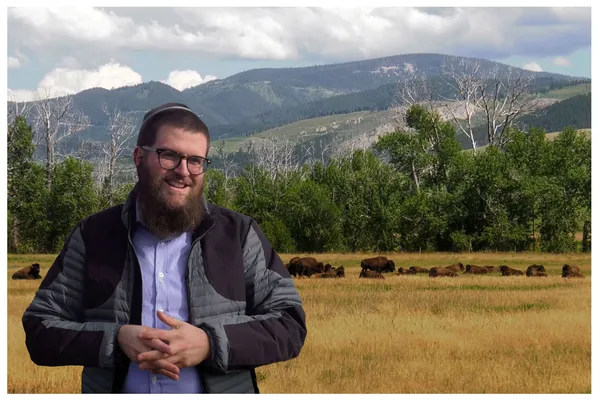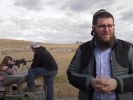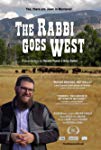Eye For Film >> Movies >> The Rabbi Goes West (2019) Film Review
The Rabbi Goes West
Reviewed by: Jennie Kermode

"I'm a salesman for Judaism," says Chaim Bruk, and his easy charm will make you believe it. Like any salesman, he is hardworking, highly focused, adored by some and loathed by others. His particular brand of Judaism doesn't reflect everybody's take on how good Jews ought to live but he firmly believes he's in the right. Travelling though Montana, trying to persuade strangers to put mezuzahs on their door frames, he's clearly doing what he loves, whilst the documentary team of Amy Geller and Gerald Peary explore what it means to the people he visits and to the wider Jewish community.
If there's one thing that matters to practically everyone with a Jewish upbringing, it's community. Montana is one of America's least populous states, a place where one can wander for days without meeting another human being, and only one in every 200 of its inhabitants is a Jew. It's a difficult place to follow a traditional way of life that revolves around communal activities. When Chaim arrives at the door offering to pray with people, sometimes bringing food, it's tempting even to the secular Jews whom he hopes to draw back into religious observance. For those close enough to population centres to make it practicable, he offers shared rituals, parties, traditional food and drink, new friends. Isn't this, perhaps, a bit like the behaviour of a cult? No, he says, because if people want to leave then they can do so at any time and he won't bother them about it.

What this is is Chabad Lubavitch, an Orthodox movement which, alongside its friendly outreach policy, has a strong belief in Zionism, strict views on gender roles and a commitment to bringing about the speedy return of the Messiah so that all the world will fall under its rule. Some of the other Jewish leaders interviewed in the film object strongly to these ideas and accuse Chabad of keeping them conveniently out of sight whilst proselytising. Local conservative rabbi Francine Roston argues that Chaim's activities on her turf are forbidden by Jewish law. Reform rabbi Ed Stafman questions Chaim's thoughts about Palestinians and gets an answer that seems somewhat a odds with the Chabad line that there is good to be found in everyone.
Taking Chaim's side is his wife, Chavie, who speaks passionately about the fact that she doesn't deem it necessary to have all the same opportunities as a man in order to be an independent woman whose views are respected. She argues that women have, if anything, a more important role in Orthodox culture because God asks more of them. When she poses for the camera alongside her husband, she has the look of an early settler in the Big Sky Country: bold, capable, devoted, archaic.
Other issues emerge in increasing number to complicate the narrative as the documentary progresses. If you come from a minority community yourself you may spot straight away the risks attendant with identifying a household as Jewish through the presence of a mezuzah. Two of the people we meet here have been targeted by anti-Semitic extremists. The children of Holocaust survivors recognise the risks and nobody denies that purges could happen just as easily in today's America. But should people give up on their traditions out of fear? Could it, in fact, be more important to be visible, to be open about Jewishness so that gentiles see what a Jew looks like and are less vulnerable to misinformation?
There are no easy answers here. Geller and Peary are at pains not to take sides. Perhaps a a result of this, their film has been sanctioned for viewing by the Hasidic community, which tends to take a negative view of most cinematic output. Viewers from all backgrounds will find it an intriguing and educational film, which puts across a good deal about the nature of life in Montana alongside its central focus. One of the last places in North America to be inhabited by settlers from other continents, it continues to feel like the edge of the world. The rabbi has nowhere else to go.
Reviewed on: 06 Nov 2019
















